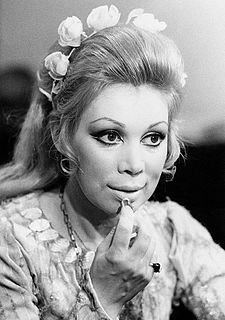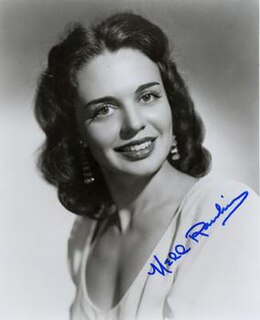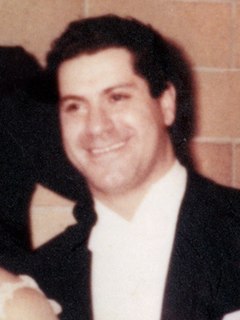Related Research Articles

The Metropolitan Opera is an American opera company based in New York City, resident at the Metropolitan Opera House at Lincoln Center, currently situated on the Upper West Side of Manhattan. The company is operated by the non-profit Metropolitan Opera Association, with Peter Gelb as general manager. As of 2018, the company's current music director is Yannick Nézet-Séguin.

Renata Scotto is an Italian soprano and opera director.

Mary Violet Leontyne Price is an American soprano who was the first African American soprano to receive international acclaim. From 1961 she began a long association with the Metropolitan Opera, where she was the first African American to be a leading performer. She regularly appeared at the world's major opera houses, the Royal Opera House, San Francisco Opera, Lyric Opera of Chicago, and La Scala, the last at which she was also the first African American to sing a leading role. She was particularly renowned for her performances of the title role in Verdi's Aida.

Mirella Freni, OMRI was an Italian operatic soprano who had a career of 50 years and appeared at major international opera houses. She received international attention at the Glyndebourne Festival, where she appeared as Zerlina in Mozart's Don Giovanni and as Adina in Donizetti's L'elisir d'amore.

Nell Rankin was an American operatic mezzo-soprano. Though a successful opera singer internationally, she spent most of her career at the Metropolitan Opera, where she worked from 1951 to 1976. She was particularly admired for her portrayals of Amneris in Verdi's Aida and the title role in Bizet's Carmen. Opera News said, "Her full, generous tone and bold phrasing, especially in the Italian repertory, were unique among American mezzos of her generation.

Rosa Raisa was a Polish-born and Italian-trained Russian-Jewish dramatic operatic soprano who became a naturalized American. She possessed a voice of remarkable power and was the creator of the title role of Puccini's last opera, Turandot, at La Scala, Milan.

Susannah is an opera in two acts by the American composer Carlisle Floyd, who wrote the libretto and music while a member of the piano faculty at Florida State University. Floyd adapted the story from the Apocryphal tale of Susannah and the Elders, though the latter story has a more positive ending. The story focuses on 18-year-old Susannah Polk, an innocent girl who is targeted as a sinner in the small mountain town of New Hope Valley, in the Southern American state of Tennessee.

Risë Stevens was an American operatic mezzo-soprano and actress. Beginning in 1938, she sang for the Metropolitan Opera in New York City for more than two decades during the 1940s and 1950s. She was most noted for her portrayals of the central character in Carmen by Georges Bizet. From 1963 to 1968 she was director of the Metropolitan Opera National Company.

Lucine Amara is an American soprano who was chiefly based at the Metropolitan Opera in New York.

Licia Albanese was an Italian-born American operatic soprano. Noted especially for her portrayals of the lyric heroines of Verdi and Puccini, Albanese was a leading artist with the Metropolitan Opera from 1940 to 1966. She also made many recordings and was chairwoman of The Licia Albanese-Puccini Foundation, which is dedicated to assisting young artists and singers.
Tulsa Opera is an American opera company based in Tulsa, Oklahoma.
Frank Corsaro was one of America's foremost stage directors of opera and theatre. His Broadway productions include The Night of the Iguana (1961).

Enrico Di Giuseppe was a celebrated American operatic tenor who had an active performance career from the late 1950s through the 1990s. He spent most of his career performing in New York City, juggling concurrent performance contracts with both the New York City Opera and the Metropolitan Opera during the 1970s and 1980s. In the latter part of his career, he was active with the Grand Opera House.

Frank Guarrera was an Italian-American lyric baritone who enjoyed a long and distinguished career at the Metropolitan Opera, singing with the company for a total of 680 performances. He performed 35 different roles at the Met, mostly from the Italian and French repertories, from 1948 through 1976. His most frequent assignments at the house were as Escamillo in Georges Bizet's Carmen, Marcello in Giacomo Puccini's La Bohème, Valentin in Charles Gounod's Faust, and Ping in Puccini's Turandot. He was also an admired interpreter of Mozart roles, establishing himself in the parts of both Guglielmo and Don Alfonso in Così fan tutte and Count Almaviva in Le nozze di Figaro. Most of the roles he portrayed were from the lyric repertoire, such as the title role in Tchaikovsky's Eugene Onegin, but he also sang some heavier roles at the Met like Amonasro in Aïda, Jack Rance in La fanciulla del West and Il conte di Luna in Il trovatore.
William L. Lewis is an American operatic tenor and academic.
Jean Kraft was an American operatic mezzo-soprano. She began her career singing with the New York City Opera (NYCO) during the early 1960s, after which she embarked on a partnership with The Santa Fe Opera from 1965 through 1987. In 1970 she joined the roster of singers at the Metropolitan Opera in New York City where she remained a fixture until 1989. She also performed as a guest of many other opera companies throughout the United States. In 2005 Opera News called her "a gifted mezzo and observant, imaginative actress who lent distinction to a wide range of character roles. By the end of her Met tenure, she had sung nearly 800 performances and become a solid audience favorite."
Maralin Niska was an American operatic soprano. Well known as a singing-actress, she was a mainstay of the New York City Opera during the 1960s and 1970s. She was also a regular performer at the Metropolitan Opera from 1970 to 1977.
Opera North is an opera company based at The Grand Theatre, Leeds. This article covers the period when the company's music director was Paul Daniel.
Francesca Roberto is an American operatic soprano. A winner of the Metropolitan Opera National Council Auditions, she sang leading roles throughout the United States during the 1960s and early 1970s.
Michael Manuel was an English opera director, set designer, stage manager, and screenwriter who was associated with the Metropolitan Opera. He is chiefly remembered for his work as director of the Metropolitan Opera National Company in the mid 1960s. He later worked as researcher and script writer for John Heyman's film series "The New Media Bible", including the 1979 film Jesus which has been translated into more languages than any other film.
References
- ↑ Allan Kozinn (April 7, 1999). "Michael Manuel, Director, 70; Worked at Met". The New York Times .
- 1 2 3 4 5 6 7 8 9 10 Martin Bernheimer (August 2006). "The Not-So-Grand Tour". Opera News . Vol. 71, no. 2. pp. 40–45.
- ↑ Rudolf Bing (1972). 5000 Nights at the Opera. Doubleday. ISBN 9780385092593.